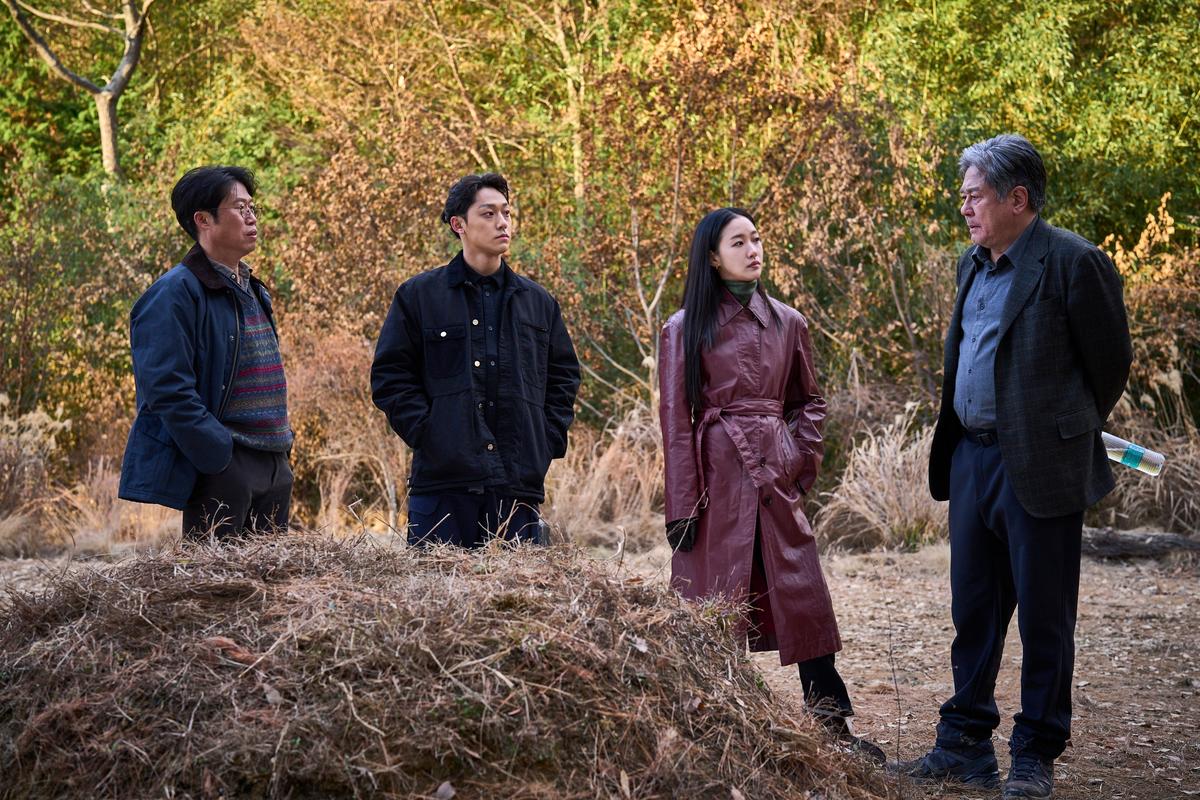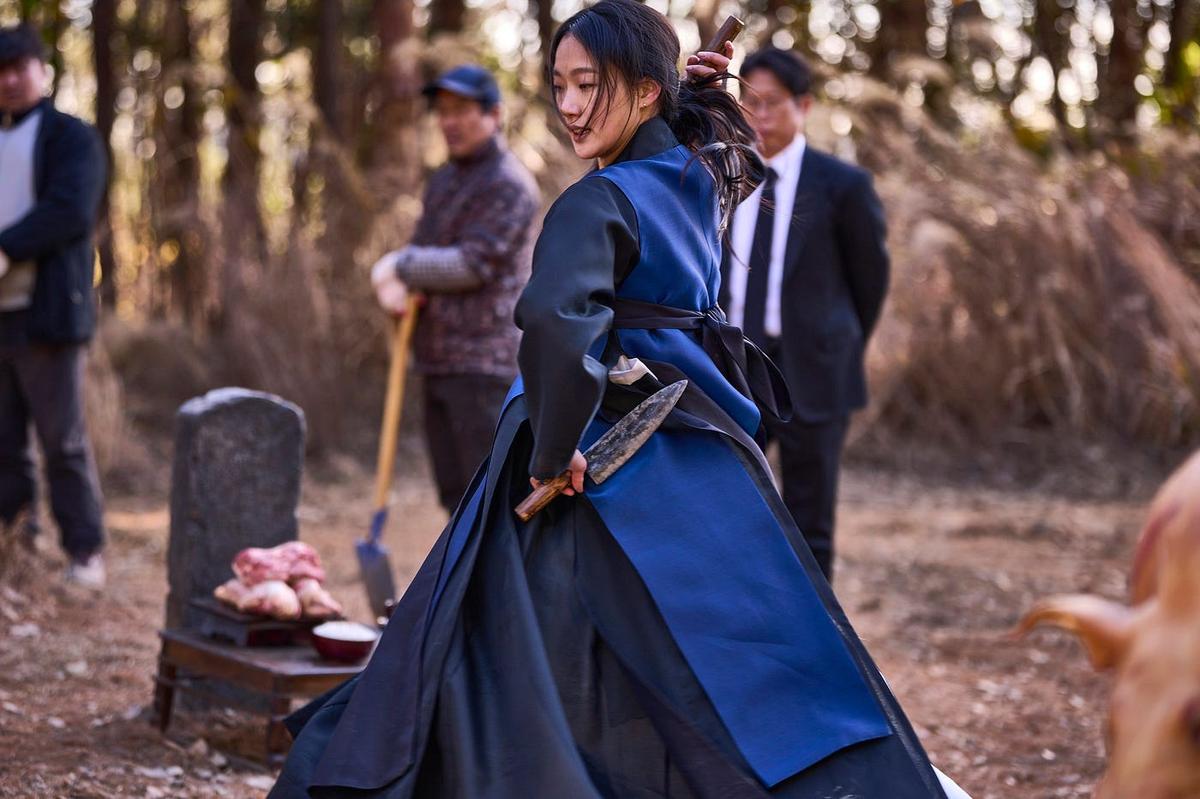

Choi Min-sik and Yoo Hae-jin in a still from ‘Exhuma’
| Photo Credit: YouTube/ColumbiaPicturesPhils
Korean director Jang Jae-hyun’s latest offering is a tantalizing blend of terror and tradition set against the backdrop of the creepy forested countryside near the North Korean border. Exhuma marries the macabre with a celebration of Korean cultural richness (a tried and tested formula for success), seamlessly blending horror subgenres and unearthing the haunting legacy of colonial occupation.
The film follows two shaman siblings, Hwa-rim (Kim Go-eun) and Bong-gil (Lee Do-hyun), who are summoned to aid a wealthy Korean immigrant family plagued by a malevolent force targeting their newborn son. They are joined by veteran geomancer Sang-deok (a fantastic Choi Min-sik) and his Christian apprentice Yeong-geun (Yoo Hae-jin) in proper Korean Ghostbusters fashion, setting the stage for layers and layers of horrifying truths waiting to be unravelled.
The cast offset the contrasting generations of occult dealers with Go-eun’s Hwa-rim embodying a more hopeful, risk-taking opportunism against Min-sik’s pragmatism. Both standout performances complement each other and serve as the building blocks for the team’s fluid chemistry.
Exhuma (Korean)
Director: Jang Jae-hyun
Cast: Kim Go-eun, Choi Min-sik, Lee Do-hyun, Yoo Hae-jin
Runtime: 134 minutes
Storyline: The process of excavating an ominous grave unleashes dreadful consequences buried underneath.
Exhuma expertly borrows from East Asian folk horror classics in tone and themes, paying homage to the genre while forging its own path of terror. Echoes of revered predecessors like The Wailing and Incantation reverberate throughout the film, manifesting in its embrace of atmospheric dread and immersing viewers in a world where the line between the supernatural and the mundane blurs with chilling ease. Much like its forebears, Exhuma proves to be a wicked addition to the folk horror canon.
What sets Exhuma apart is its richly detailed cultural symbolism. Where Korean auteur Na Hong-jin scratches the surface as a crash course in Korean folklore, Exhuma keeps digging, and digging some more, uncovering a history of ritualist beliefs and practices, bones and all. Drawing from Korean shamanism, Buddhism, Christianity, and neighbouring traditions including feng shui, cremation rituals and myriad foreboding omens; the film benefits from a basic nuanced grasp of Korean spirituality. However, the script excels at elucidating its rules, ensuring easy comprehension and heightened terror that will leave you eager to dig even deeper.

Yoo Hae-jin, Lee Do-hyun, Kim Go-eun and Choi Min-sik in a still from ‘Exhuma’
| Photo Credit:
YouTube/ColumbiaPicturesPhils

The film is also a meditation on the lingering scars of colonialism, particularly the trauma inflicted by the Japanese occupation during World War II. The film confronts the legacy of oppression and explores the depths of generational trauma. A flight attendant’s mistaken assumption about Hwa-rim’s nationality in the opening scene foreshadows a twist that permeates the film’s dual folkloric identities.
But don’t let the cultural deep dive scare you off — the film also serves as a multivocal blend of horror subgenres for everyone to sink their teeth into. The story, told in two parts, metamorphoses from a run-of-the-mill exorcism nightmare into an unexpected creature-feature and delivers the goods with a distinct narrative style.

Kim Go-eun in a still from ‘Exhuma’
| Photo Credit:
YouTube/ColumbiaPicturesPhils
Visually stunning and an aural feast, Exhuma is a testament to the power of practical effects and immersive sound design — from the grotesque ‘anima’ that would have Shogun fans bricking themselves, to the mesmerizing orchestration of a traditional Korean shamanic ritual, transferring malevolent spirits into five pig carcasses through some cool swordplay, vibrant attire and some buk drum rhythms.
While Exhuma may falter slightly in its pacing, stretching its runtime longer than necessary, its complexity and thematic depth more than compensate for its extended stay. Sure, the film may not offer conventional scares, but it doesn’t matter when you’re this immersed in a story. With its amalgamation of cultural authenticity, historical resonance, and good old-fashioned genre tricks, there is more to Exhuma than meets the eye.
Exhuma is currently running in theatres.